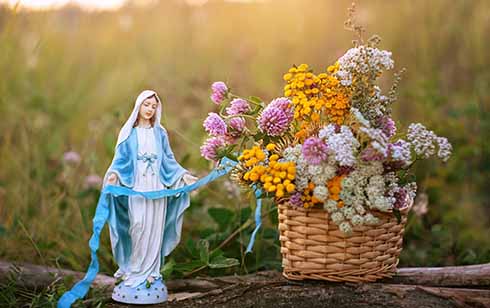 My cousin once wrote: ‘When people ask me about my origins and my family, I always start with “Oooh, it’s a long story. It goes back to the Ottoman empire, First World War and then the Nakba of 1948 . . .”’ I resonate with his comments.
My cousin once wrote: ‘When people ask me about my origins and my family, I always start with “Oooh, it’s a long story. It goes back to the Ottoman empire, First World War and then the Nakba of 1948 . . .”’ I resonate with his comments.
My faith from a very young age was inspired by the faith of my grandmother. My Italian-born nonna, immigrated to Australia with her Syrian husband in 1956 when she was 55. How did she deal with living the Gospel in a diverse community?
When she arrived in Australia, she was fluent in Italian, Arabic and French. Not much use in a predominantly Anglo-Saxon and Protestant community, with cultural and social norms significantly different from those in Italy or Syria.
Adapting to a new language, customs and social expectations would have been a major hurdle. Actually, my nonna really didn’t learn to speak English. Her community was her family, as is the custom in Mediterranean families, and the eldest child (my father) takes responsibility for the care of the parents. So Nonna was always a part of our lives.
CHURCH AND CULTURAL GROUPS
The diverse communities I am thinking of are culture groups that immigrated to Australia and formed church social groups.
The Italian alumni from Salesian Colleges in various places overseas, particularly, would come together four times a year at the Don Bosco Centre in Brunswick. I can remember the smell of the chestnuts roasting on an open flame. The people were a long way from their original surroundings and cultural groups, yet maintained a sense of belonging through coming together because of shared experiences.
It's a similar experience today when the Filipino community in various parishes comes together for the Flores De Mayo Feast or the Misa de Gallo for the nine days before Christmas.
These cultural groups may have faced barriers in everyday communication, employment and social integration because their proficiency in English was limited, but they are able to come together to commemorate the celebrations of their homelands.
These are just some examples of how faith is sustained when diverse cultures live the Gospel in this country. These communities also find connection in celebrating meaningful cultural events. For example, there was a year-long celebration of the Maronites’ 50 years in Australia, with the procession of the relics of four saints throughout the Maronite churches. Such living of the faith is evident especially in the lives of young people. It gives us great hope for the future.
For my nonna, she was looked after in the family. She didn’t have to cope with the challenges of finding suitable employment, as sometimes there were limited job opportunities for migrants, even though there was an active immigration policy to boost population and the labour force.
SUCCESSFUL LIVES
Despite these challenges, I believe many migrants such as my nonna were able to build successful lives through faith, resilience, community support and determination.
Most Italians were Roman Catholic, and after immigrating to Australia remained Catholic, living the Gospel. They continued the tradition of processions of the saint of their towns and built clubs that were available to all. Their sense of community was strong, and that remained with them. Attending religious services and congregational social events helped them find strength, comfort and friendships.
In returning to the example of my nonna, annually she would make the pilgrimage to one of the few churches where she could attend Confession with an Italian-speaking priest. At Christmas we would go as a family to attend Midnight Mass in Italian.
EVER PRESENT FAITH
For Nonna her faith never failed her. She would go to Sunday Mass in English every week, and listen to a Mass where she understood very little. However, from the moment she arrived here, the trinity of prayers never left her. Until she died at the age of 106, she continued to pray daily in her own language the Our Father, the Hail Mary, and the Nicene Creed (word for word). Occasionally I would be present when the Extraordinary Minister of the Eucharist would visit our home, and I would sit in awe at her ability to continue these prayers on her own.
While the journey of living the Gospel in a diverse community was undoubtedly demanding, the support of the Catholic Church, social activities and community connections played a crucial role in helping immigrants navigate their new lives in Australia.
CULTURAL CELEBRATIONS
Flores de Mayo (Spanish for ‘flowers of May’) is a festival held in the Philippines in the month of May. It is one of the May devotions to the Blessed Virgin Mary and lasts for the entire month.
Misa de Gallo (Spanish for ‘Rooster’s Mass’, also Misa de los Pastores, ‘Shepherds’ Mass’) is the Midnight Mass celebrated in Spain and many former Spanish colonies on Christmas Eve and sometimes in the days immediately preceding Christmas. The Filipino version is the Simbang Gabi (Tagalog for ‘Night Mass’), also called Misa de Aguinaldo (‘Gift Mass’). It traditionally begins on 16 December and ends on 24 December.